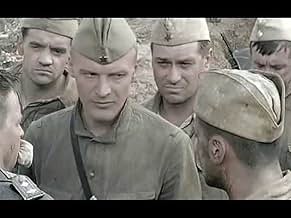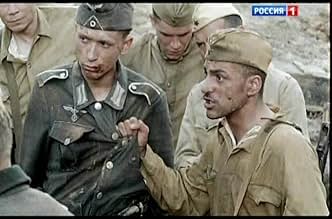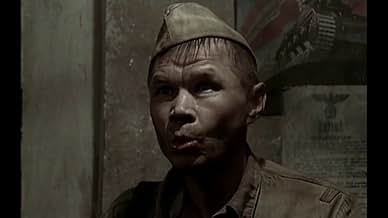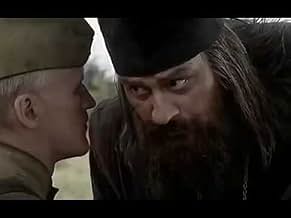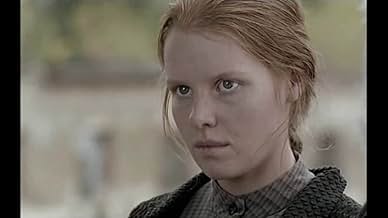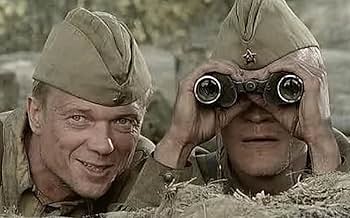Shtrafbat
- Serie TV
- 2004
- 9h 10min
VALUTAZIONE IMDb
7,3/10
1635
LA TUA VALUTAZIONE
Aggiungi una trama nella tua linguaDrama of the penalty parts of political prisoners, who fought on the Soviet fronts.Drama of the penalty parts of political prisoners, who fought on the Soviet fronts.Drama of the penalty parts of political prisoners, who fought on the Soviet fronts.
- Premi
- 2 candidature totali
Sfoglia gli episodi
Recensioni in evidenza
"Shtrafbat" (2004), an 11-part TV series, is about Soviet Army battalions made up of many kinds of prisoners, hoping to be "rehabilitated" of their "crimes".
"Shtrafbat" (Punishment or Penal Battalions) were made up of deserters, political prisoners, and former POWs who had returned from German captivity (according to Stalin: allowing ones-self to be captured alive & imprisoned was akin to surrendering, & surrendering was considered to be treason, a crime punishable by death), and even "regular" criminals sent from prison-camps, so the suspicion that these people wouldn't fight well, or might even surrender, was high. These "criminals" were "graciously" allowed "a second chance" by the government, a chance to "wash away their past sins with their own blood."
These "Shtrafbat" were sent on the most dangerous and difficult missions (i.e. those with low survivability) and were followed into battle by troops who were called "Zagrad-Otryad" (Blocking Troops), and were under NKVD (precursor to the KGB) control. Sometimes these troops were almost as large as the actually fighting units they blocked. They were under orders to shoot any Soviet soldiers who were thought to be retreating, be they wounded or not.
The few "Shtrafbat" soldiers who lived through it for some months, were considered rehabilitated and returned to regular army units. The KIAs were rehabilitated posthumously, sparing their families from being branded as families of traitors, "enemies of the Soviet people."
"Shtrafbat" (Punishment or Penal Battalions) were made up of deserters, political prisoners, and former POWs who had returned from German captivity (according to Stalin: allowing ones-self to be captured alive & imprisoned was akin to surrendering, & surrendering was considered to be treason, a crime punishable by death), and even "regular" criminals sent from prison-camps, so the suspicion that these people wouldn't fight well, or might even surrender, was high. These "criminals" were "graciously" allowed "a second chance" by the government, a chance to "wash away their past sins with their own blood."
These "Shtrafbat" were sent on the most dangerous and difficult missions (i.e. those with low survivability) and were followed into battle by troops who were called "Zagrad-Otryad" (Blocking Troops), and were under NKVD (precursor to the KGB) control. Sometimes these troops were almost as large as the actually fighting units they blocked. They were under orders to shoot any Soviet soldiers who were thought to be retreating, be they wounded or not.
The few "Shtrafbat" soldiers who lived through it for some months, were considered rehabilitated and returned to regular army units. The KIAs were rehabilitated posthumously, sparing their families from being branded as families of traitors, "enemies of the Soviet people."
Shtrafbat is the story of a Soviet penal battalion at the height of the Second World War. The film follows the characters from the formation of the battalion in the prison yard to its complete decimation in combat against the Germans.
The film is a good introduction to the complexities of the Soviet war effort, covering the various motivations the characters have for signing up and the callous attitude of the military towards these people as well as giving a good idea of what an absolute hell the Eastern Front was.
The premise and the acting are generally good, but the story seems to move along in fits due to a mediocre directorial effort on the part of Dostal'. Perhaps he was unfamiliar with the mini-series format or just short on time, I don't know, but on the whole the film seems rather artificial and constructed. Segue contrast with "Seventeen Moments of Spring" and "Shield and Sword". Oh Well.
Shtrafbat could have been a whole lot better. Certainly. It is nonetheless worth watching for the history and (if for nothing else) the excellent final scene.
The film is a good introduction to the complexities of the Soviet war effort, covering the various motivations the characters have for signing up and the callous attitude of the military towards these people as well as giving a good idea of what an absolute hell the Eastern Front was.
The premise and the acting are generally good, but the story seems to move along in fits due to a mediocre directorial effort on the part of Dostal'. Perhaps he was unfamiliar with the mini-series format or just short on time, I don't know, but on the whole the film seems rather artificial and constructed. Segue contrast with "Seventeen Moments of Spring" and "Shield and Sword". Oh Well.
Shtrafbat could have been a whole lot better. Certainly. It is nonetheless worth watching for the history and (if for nothing else) the excellent final scene.
Life in the Soviet Union's penal battalions was horrific, and this series does a wonderful job of portraying the ugly reality for many persons who perished during the second world war. It is not for the faint-hearted, and certainly extremely realistic when it comes to the ugliness of patriarchal society, and the vision men had (have) of women, many times as mere sex-objects. Certainly the series explores the basal level of the ugliness of human nature, which makes it that much more believable.
Its only detriment, is a cheap politicised usage of religion, especially for Russian nationalistic purposes (otherwise it would have merited a "9 star" rating). Overlook it, and the production is truly a masterpiece of war drama.
If you're looking for a war series that doesn't just depict battles but truly captures the human cost of war, Strafbat (Penal Battalion) is an absolute must-watch. This 2004 Russian TV series is a brutal, gripping, and deeply emotional portrayal of Soviet penal battalions during World War II-units made up of former prisoners and disgraced soldiers sent on near-suicidal missions to redeem themselves through combat.
Authenticity and Realism One of Strafbat's biggest strengths is its raw realism. Unlike many war dramas that glorify heroism, this series strips war down to its harshest truths-desperation, sacrifice, and the thin line between survival and honor. The production design is immersive, with detailed period-accurate uniforms, weaponry, and locations that make you feel like you're right there in the trenches.
Complex Characters and Morality What sets Strafbat apart is its incredible character depth. The soldiers in the penal battalion aren't your typical heroes-they are criminals, deserters, and men who have lost everything. Yet, as the series progresses, you begin to understand their humanity, their motivations, and the impossible choices they face. Alexey Serebryakov delivers a powerhouse performance as Major Tverdokhlebov, a commander trying to lead men who have been given no hope. His moral struggle, combined with the way the penal battalion members evolve, adds layers of emotional weight to every scene.
A Story of Redemption and Brotherhood Despite its bleak premise, Strafbat isn't just about suffering-it's also about resilience, redemption, and the unbreakable bond between soldiers. These men, who start off as outcasts, form a brotherhood forged in fire. Their camaraderie, defiance, and small victories make their journey deeply compelling.
Cinematic Storytelling From its intense battle sequences to its quieter, character-driven moments, Strafbat is beautifully shot and directed. The cinematography captures both the chaos of war and the haunting stillness in between, while the soundtrack adds to the emotional depth without being overbearing.
Why You Should Watch It If you're a fan of historical dramas that don't shy away from the grim realities of war (Band of Brothers, Come and See, Generation War), Strafbat is a hidden gem. It's an emotionally powerful, thought-provoking series that stays with you long after the final episode. More than just a war story, it's a testament to the strength of the human spirit in the face of impossible odds.
⭐ Final Verdict: 9.5/10 - An absolute masterpiece of war television, blending historical accuracy with raw emotional storytelling. Highly recommended!
Authenticity and Realism One of Strafbat's biggest strengths is its raw realism. Unlike many war dramas that glorify heroism, this series strips war down to its harshest truths-desperation, sacrifice, and the thin line between survival and honor. The production design is immersive, with detailed period-accurate uniforms, weaponry, and locations that make you feel like you're right there in the trenches.
Complex Characters and Morality What sets Strafbat apart is its incredible character depth. The soldiers in the penal battalion aren't your typical heroes-they are criminals, deserters, and men who have lost everything. Yet, as the series progresses, you begin to understand their humanity, their motivations, and the impossible choices they face. Alexey Serebryakov delivers a powerhouse performance as Major Tverdokhlebov, a commander trying to lead men who have been given no hope. His moral struggle, combined with the way the penal battalion members evolve, adds layers of emotional weight to every scene.
A Story of Redemption and Brotherhood Despite its bleak premise, Strafbat isn't just about suffering-it's also about resilience, redemption, and the unbreakable bond between soldiers. These men, who start off as outcasts, form a brotherhood forged in fire. Their camaraderie, defiance, and small victories make their journey deeply compelling.
Cinematic Storytelling From its intense battle sequences to its quieter, character-driven moments, Strafbat is beautifully shot and directed. The cinematography captures both the chaos of war and the haunting stillness in between, while the soundtrack adds to the emotional depth without being overbearing.
Why You Should Watch It If you're a fan of historical dramas that don't shy away from the grim realities of war (Band of Brothers, Come and See, Generation War), Strafbat is a hidden gem. It's an emotionally powerful, thought-provoking series that stays with you long after the final episode. More than just a war story, it's a testament to the strength of the human spirit in the face of impossible odds.
⭐ Final Verdict: 9.5/10 - An absolute masterpiece of war television, blending historical accuracy with raw emotional storytelling. Highly recommended!
Just saw two episodes. Such a refreshing view, despite the grim subject, to see actors playing the story and not their narcissism. Perhaps it's the script but I don't know. These actors are great. The absence of big bucks is funny sometimes, battle scene in minefield, but then artistic. I haven't watched Band of Brothers end to end. Hear it is very good. But to see real passion and not sentimentality, argument and not posing, the glimpses of the women are amazing, the clarity of the narrative, the steady invention with the camera without being arty, and the absence of gratuitous gore. All left to the actors and story. Anyway, just a joy.
Lo sapevi?
- ConnessioniReferenced in Comedy Club: Episodio #1.13 (2005)
I più visti
Accedi per valutare e creare un elenco di titoli salvati per ottenere consigli personalizzati
Dettagli
- Data di uscita
- Paese di origine
- Lingua
- Celebre anche come
- The Penal Battalion
- Aziende produttrici
- Vedi altri crediti dell’azienda su IMDbPro
- Tempo di esecuzione
- 9h 10min(550 min)
- Colore
Contribuisci a questa pagina
Suggerisci una modifica o aggiungi i contenuti mancanti

